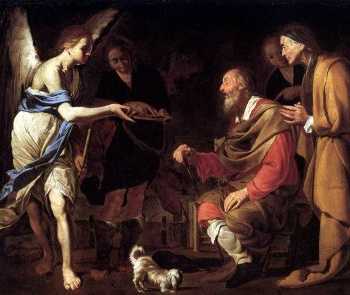 The first reading today is from the book of Tobit. The book of Tobit is unique to the Catholic bible because the Protestant bible does not include this book. Catholics believe that the book of Tobit is the inspired word of God and the Protestant religions do not. There is a clear correlation though between the book of Tobit, the Gospel parable about the tenants in the vineyard, and that Jesus Christ came to earth as God’s own son and was put to death by his own people though. This is explained more in depth in both of the scripture readings for mass today.
The first reading today is from the book of Tobit. The book of Tobit is unique to the Catholic bible because the Protestant bible does not include this book. Catholics believe that the book of Tobit is the inspired word of God and the Protestant religions do not. There is a clear correlation though between the book of Tobit, the Gospel parable about the tenants in the vineyard, and that Jesus Christ came to earth as God’s own son and was put to death by his own people though. This is explained more in depth in both of the scripture readings for mass today.
The book of Tobit tells of the kindness of Tobit to his people. He even had a feast prepared and was going to share this wonderful meal with one of the poorest of his people who were exiled in Nineveh. He sent his son to find a poor person among their people to share this meal with, but all he found was one of their own people that was murdered in the market place.
That sounds a great deal like the goodness of God and how he sent his son to us out of love for us as well, and we murdered him too.
Jesus tells a parable in the Gospel today about a man who planted a vineyard and leased it to the tenants. He sent one slave and then another and another and they just kept killing his slaves and would not give to him the fruit that he had planted. This man finally sent his son to them and they killed him as well.
That sounds a great deal like the way God sent his prophets to us throughout the ages before the coming of Christ and they too were abused and mistreated. Then, after all the prophets God sent His son to His people and they rejected His own son and then killed him too. The Gospel today ends by saying “When they realized that he had told this parable against them, they wanted to arrest him”. Even the Jewish people understood that the prophets foretold of Christ’s coming, but they rejected Jesus as the son of God. They did not accept that he was who he said he was. But, Jesus also foretold what was to happen to him too. He knew they would kill him too. And God would “give the vineyard to others”. We are the “others” that Jesus spoke of. The Jewish people rejected Him and they were God’s chosen people, so God brought salvation to all those that would accept his son, including the Gentiles. But, they did not want to excite the crowd further “so they went away”.
Sometimes we reject Jesus too, in little ways and big ones as well. It’s sometimes easier not to allow Jesus, who is love incarnate, into our hearts because love makes us vulnerable. When we love we become vulnerable to hurt. Sometimes people reject others or push them away for fear of getting hurt. The unfamiliar territory of love up close and personal, is just too much for some people. They are more comfortable with distance between themselves and keeping others at an arms length where they feel safe from any personal entanglements. Sometimes people rely on rules, routine, “the way things have always been done” as a sort of security blanket to hold on to. Letting go of these things, this security blanket, is frightening because they do not really understand what is left. Sometimes people distance themselves even further from those who have the capacity to love them the most and they too, “go away” rather than accept love in a deeper, perhaps more intimate way than they have ever known. This occurs sometimes with young couples who are dating but then find themselves afraid to fall in love and they run away from love rather than open themselves up to something beautiful that they have never experienced before.
Perhaps this week we could allow ourselves to be a little more vulnerable, a little more open to letting others get to know us, warts and all. It really is possible that they might not reject us after they learn we have flaws, shortcomings and sins. Jesus was the only person the world has ever known that didn’t have any flaws, shortcomings or sins. But, Christ accepted human weaknesses and never held anyone’s flaws against them so long as they came to him, believed in him, accepted him and loved him.
We should also remember that Christ was vulnerable to insults, abuse and hurt because he loved us, though. Can we do no less with one another?
